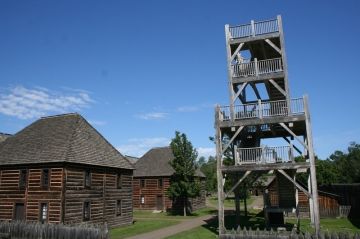Fort William Historical Park

Park Amenities:
Fort William Historical Park is a sightseeing destination and a place of history located on the banks of the Kaministiquia River in the community of Thunder Bay, Ontario, Canada. Thunder Bay is part of the North of Superior region of Northern Ontario, Canada.
The Fort William Historical Park - named after Chief Director William McGillivary - is a replica of the North West Company's trading fort and inland headquarters during the 1800s. The fort was the first permanent settlement in the area.
The historical fort includes over 42 replica buildings which once housed and served fur trappers, French Canadian voyageurs, pioneer farmers and the Ojibway and Metis First Nation people.
The fort was the site of many battles and conflicts during the early days of Canada. The fur trading fort is said to be the largest recreated fur trading post in the world.
Throughout the fort grounds are actors dressed in period clothing. They go about their day as if back in time. The actors operate the shops, participate in the interactive exhibits and host entertainment throughout the day.
The period actors also provide tours and interactive programs. Tours include paddle adventures on the Kaministiquia River, guided walking tours, horse drawn carriage rides and interactive programs.
Interactive programs could include such activities as creating artifacts in the artisan shop. Here one can create keepsakes from wood, metal and/or leather materials like mukluks, tin pots, leather mitts, wooden buckets, coat hangers and more.
The Fort William Historical Park is the site of heritage festivals and community events throughout the year. The park also provides educational programs for young children... and for the older children their are overnight adventures.
The fort is equipped with facilities with modern technology and many services. There are convention and conference facilities for large groups and corporate functions... and a full service amphitheatre for large productions.
There is an information centre with a touch screen kiosk to assist you in your planning. Visit displays like the birch bark canoes, hundreds of furs, the working farm, the fresh baked goods in the bakery and the First Nation Teepees (Tipi). The aboriginal camp details the life and times of the Ojibway First Nation people.
Some of the more popular buildings to visit when exploring the Fort William Historical Park include the canoe shed, the wharf, trades square (blacksmith, tinsmith, carpenter, tailor), cantine restaurant, fur stores, gaol (jail), Great Hall, indian shop and the observatory. The observatory provides great views of the Kaministiquia River and the grounds of the fort.
Explore & Visit Fort William Historical Park, Thunder Bay, Ontario, North of Superior, Canada
Address:
How To Get ToFort William Historical Park
:From the Visitor Centre there is a shuttle service which escorts visitors to the gates of the fort. For the more active visitor there is a 10 minute walking trail.





